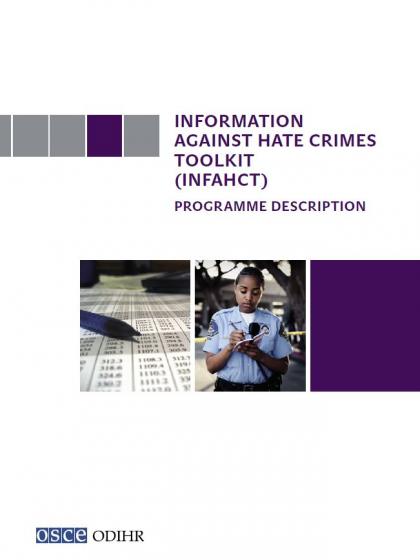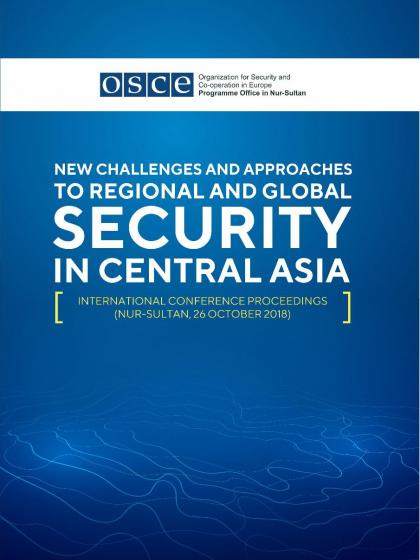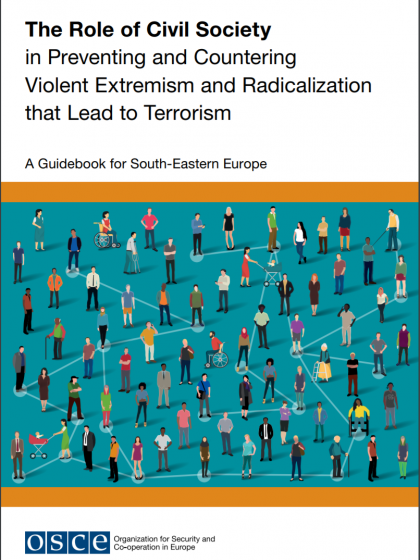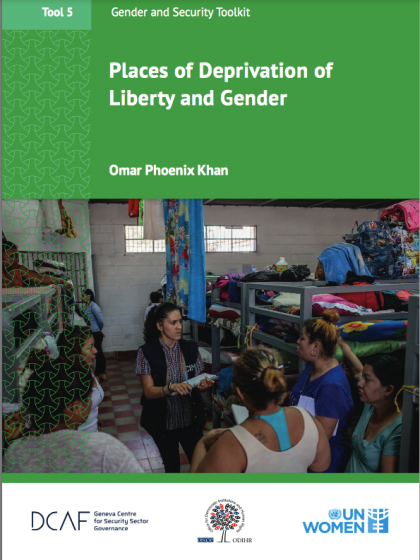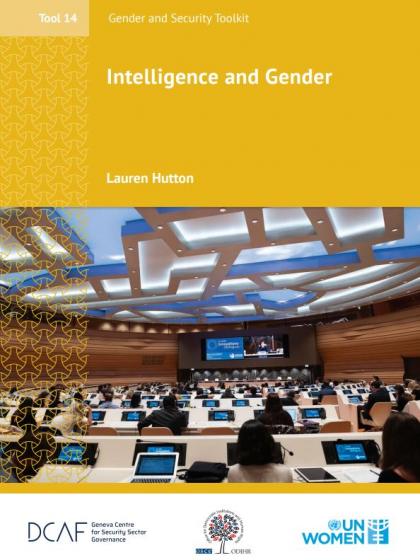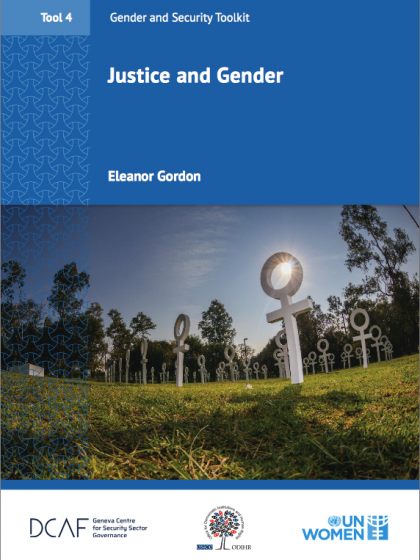Publications
Information Against Hate Crimes Toolkit (INFAHCT): Programme Description
Publishing date: 29 August 2018
Collections: Training Programmes to Counter Hate Crime
Content type: Brochure
Where we are: OSCE Office for Democratic Institutions and Human Rights
What we do: Tolerance and non-discrimination
Publisher: Organization for Security and Co-operation in Europe
The Information Against Hate Crimes Toolkit (INFAHCT) is an assistance programme aimed at improving systems for monitoring and collecting data on hate crimes. INFAHCT achieves this by helping to build and strengthen the policies and capacities of national institutions and other structures to collect data on hate crimes. INFAHCT is designed and implemented by the Office for Democratic Institutions and Human Rights (ODIHR) of the Organization for Security and Cooperation in Europe (OSCE). The OSCE is the world’s largest regional security organization, while ODIHR is the principal OSCE institution dedicated to supporting States in implementing their commitments in the area of human rights and democracy. OSCE participating States acknowledge that hate crimes pose a threat to security and may give rise to conflict and violence on a wider scale.
International conference proceedings. New Challenges and Approaches to Regional and Global Security in Central Asia.
Publishing date: 16 March 2020
Content type: Brochure
Where we are: OSCE Programme Office in Astana
What we do: Conflict prevention and resolution, Countering terrorism, Reform and co-operation in the security sector
Publisher: Organization for Security and Co-operation in Europe
On 26 October 2018 in Nur-Sultan, the OSCE Programme Office in Nur-Sultan jointly with the Friedrich Ebert Foundation and the Kazakhstan Council on International Relations, with support from the Institute of Diplomacy under the Academy of Public Administration and the Public Opinion Research Institute co-organized an international conference entitled “New Challenges and Approaches to Regional and Global Security in Central Asia”. This compendium, which includes presentations given at the conference by both Kazakhstan’s and foreign participants, explores main regional security threats in Central Asia and ways to address these problems, as well as regional co-operation issues in responding to contemporary challenges. The edition will be of interest to political scientists, international relations experts, civil servants, scholars, educators, university-level students, and broad sections of the public interested in the contemporary development of the region. The edition is published in Russian and English. The paper of Mr. Pal Dunay is written in the English language in the original, the rest of the reports are in Russian. All reports have been translated and edited with the support of the OSCE Program Office in Nur Sultan. Any opinions and recommendations expressed in the materials arising from the conference are those of the authors and do not necessarily reflect the views of the conference organizers.
The Role of Civil Society in Preventing and Countering Violent Extremism and Radicalization that Lead to Terrorism: A Guidebook for South-Eastern Europe
Publishing date: 4 July 2019
Content type: Guide / manual / handbook
Where we are: OSCE Chairmanship, OSCE Secretariat
What we do: Countering terrorism
Publisher: Organization for Security and Co-operation in Europe
The OSCE Guidebook on “The Role of Civil Society in Preventing and Countering Violent Extremism and Radicalization that Lead to Terrorism: A focus on South-Eastern Europe” is the first in a series of resources produced by the Transnational Threat Department/ Action against Terrorism Unit. This volume provides practical guidance and helpful background for both policy makers and practitioners who are working to advance civil-society-led P/CVERLT initiatives in the South-Eastern Europe region. The guidebook, “A Whole-of-Society Approach to Preventing and Countering Violent Extremism and Radicalization That Lead to Terrorism:- A Guidebook for Central Asia”, which focuses on the challenges in developing and implementing effective programmes to prevent and counter VERLT in that region, was published in January 2020.
A Whole-of-Society Approach to Preventing and Countering Violent Extremism and Radicalization That Lead to Terrorism: A Guidebook for Central Asia
Publishing date: 21 January 2020
Content type: Guide / manual / handbook
Where we are: OSCE Secretariat
What we do: Countering terrorism
Publisher: Organization for Security and Co-operation in Europe
The guidebook on “A Whole-of-Society Approach to Preventing and Countering Violent Extremism and Radicalization That Lead to Terrorism- A Guidebook for Central Asia” is one in a series of technical guidebooks produced by the Transnational Threat Department/ Action against Terrorism Unit and focuses on the challenges in developing and implementing effective programmes to prevent and counter VERLT in Central Asia. This volume aims to support policy makers in the region in the development and implementation of effective and relevant P/CVERLT strategies while strengthening the co-operation among government sectors and civil society actors.
Gender and Security Toolkit – Tool 5: Places of Deprivation of Liberty and Gender
Publishing date: 18 December 2019
Collections: Gender and Security Toolkit
Content type: Guide / manual / handbook
Where we are: OSCE Office for Democratic Institutions and Human Rights
Publisher: Organization for Security and Co-operation in Europe
Part of the Gender and Security Toolkit, this Tool:- sets out in more detail why it is important to integrate a gender perspective into policies and practices concerning places of deprivation of liberty, covering key definitions related to the topic, including a discussion on non-binary
Participation of Roma and Sinti Youth
Publishing date: 6 April 2018
Content type: Factsheet
Where we are: OSCE Office for Democratic Institutions and Human Rights
What we do: Roma and Sinti
Publisher: Organization for Security and Co-operation in Europe
Roma and Sinti youth represent a population of growing importance in the OSCE region. The average age of Roma and Sinti in the European Union is just 25 years, compared with an average age of 40 for non-Roma and Sinti people. Roma and Sinti youth continue to be stigmatized and experience unequal access to opportunities. Marginalization and discrimination often prevent them from fulfilling their potential and discourage them from participating in public and political life. Roma and Sinti women have even more limited access to participation, due to multiple forms of discrimination they face by virtue of their ethnicity and gender. When Roma and Sinti are not involved in politics their views and interests are not represented in relevant decision-making bodies and processes, which further isolates them.
Women in the Armed Forces in the OSCE Region
Publishing date: 4 June 2018
Content type: Study / report
Where we are: OSCE Office for Democratic Institutions and Human Rights
Publisher: Organization for Security and Co-operation in Europe
The OSCE participating States have made a number of commitments regarding the issue of gender equality, women´s participation in efforts to promote peace and security and equal opportunities within the security services, including the armed forces, to allow for balanced recruitment, retention and promotion of women and men. In line with its mandate to assist participating States in the implementation of human dimension commitments, the OSCE Office for Democratic Institutions and Human Rights (ODIHR) has mapped the inclusion and situation of women in the armed forces in the OSCE region through a questionnaire addressed to delegations of all 57 OSCE participating States. The information received from delegations provides a baseline against which to measure progress, gather best practices and support the assistance ODIHR provides to participating States.
Gender and Security Toolkit – Tool 14: Intelligence and Gender
Publishing date: 25 February 2020
Collections: Gender and Security Toolkit
Content type: Guide / manual / handbook
Where we are: OSCE Office for Democratic Institutions and Human Rights
What we do: Democratization, Human rights, Gender equality, Reform and co-operation in the security sector
Publisher: Organization for Security and Co-operation in Europe
Part of the Gender and Security Toolkit, the Tool:- describes why gender is important to the work of intelligence services, and introduces key concepts concerning intelligence, control and oversight of the intelligence sector, and gender;- explains how an intelligence service that embraces and
Gender and Security Toolkit – Tool 4: Justice and Gender
Publishing date: 18 December 2019
Collections: Gender and Security Toolkit
Content type: Guide / manual / handbook
Where we are: OSCE Office for Democratic Institutions and Human Rights
What we do: Human rights, Gender equality
Publisher: Organization for Security and Co-operation in Europe
Part of the Gender and Security Toolkit, this Tool:- describes why gender is important to the work of the justice sector and introduces key concepts;- provides a vision of what a justice sector that integrates a gender perspective into its work and advances gender equality will look like;-
2018-2019 Report of the Special Representative and Co-ordinator for Combating Trafficking in Human Beings
Publishing date: 21 November 2019
Collections: Annual Reports of the OSCE Office of the Special Representative and Co-ordinator for Combating THB
Content type: Annual report
Where we are: Office of the Special Representative and Co-ordinator for Combating Trafficking in Human Beings
What we do: Combating trafficking in human beings
Publisher: Organization for Security and Co-operation in Europe
This is the 2018-2019 Report produced by the OSCE Special Representative and Co-ordinator for Combating Trafficking in Human Beings (SR/CTHB) in line with its mandate as outlined in OSCE Ministerial Council Decisions No. 02/03 and 03/06. This report provides a summary of the full range of activities carried out by the Office of the SR/CTHB, with additional sections that focus on the work of the OSCE’s executive structures and field operations. This publication aims to foster increased awareness and understanding of human trafficking itself, as well as some of the challenges and opportunities currently facing the anti-trafficking community.

